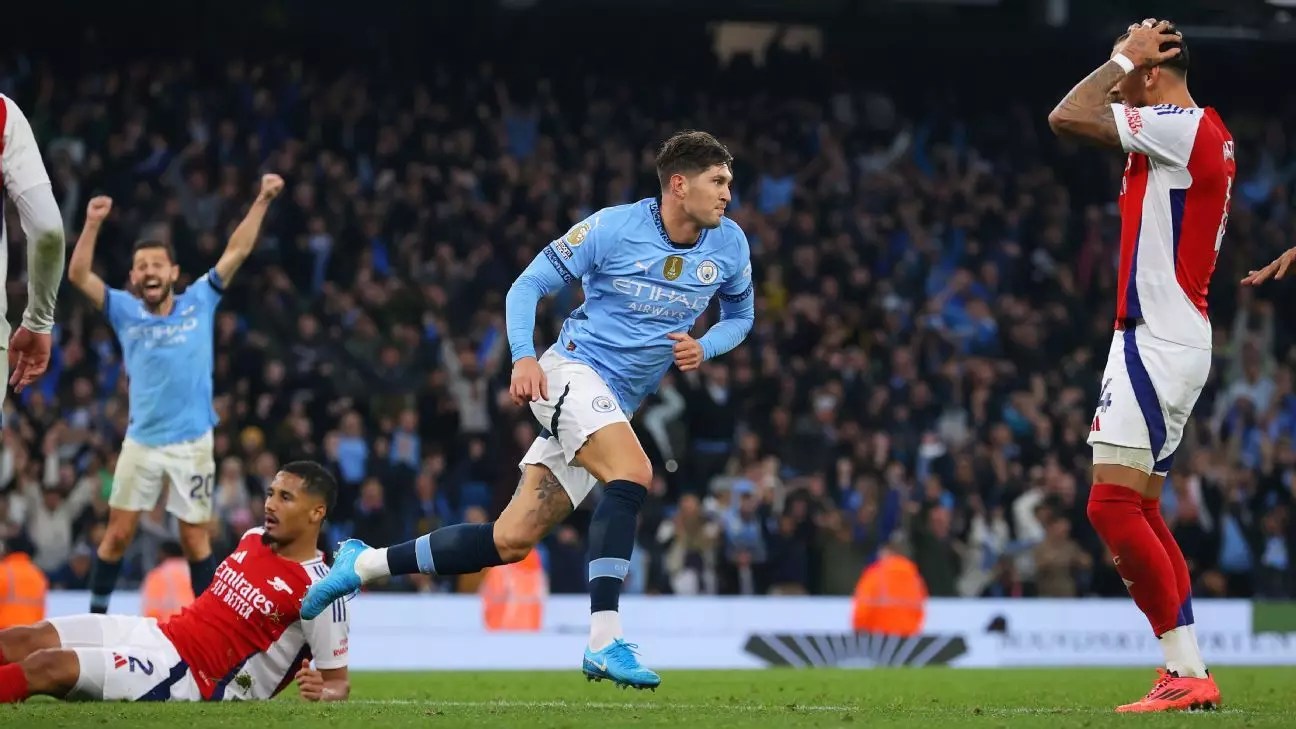The recent Premier League clash between Manchester City and Arsenal showcased not only an intense competition for the top spot but also highlighted contrasting tactical philosophies that have emerged in modern football. Arsenal’s late defensive strategy and time-management techniques came into sharp focus as City managed to grab a late equalizer, leaving fans and pundits debating the merits of such approaches on the pitch. As Manchester City’s John Stones articulated after the match, the encounter raised significant questions about the nature of play: is it clever strategy or simply unsporting behavior?
What unfolded on Sunday at the Etihad Stadium was a testament to the unpredictable nature of football. The match appeared to be sealing Arsenal’s second win after a red card to Leandro Trossard left them a man down in the second half. The Gunners had retreated into a defensive shell, hoping to maintain their slender lead against the defending champions. However, the game evolved into a battle of wills as City continued to press, ultimately finding an equalizer through John Stones in the dying moments. This goal not only extended City’s extraordinary unbeaten home streak but also punctuated the tactical chess match that had been played out over 90 minutes.
Stones candidly described Arsenal’s tactics as a disruption to City’s rhythm, labeling the approach as “clever or dirty” depending on one’s perspective. His remarks bring to light the often-understated ‘dark arts’ of football—strategies that, while effective, may dance on the periphery of sportsmanship. Arsenal’s method of slowing the game, incorporating lengthy injury breaks, and employing a more physical style of play became points of contention, leading to reflections on how the game is managed in high-pressure situations.
The Game of Time and Control
Bernardo Silva echoed Stones’ sentiments, pinpointing moments when Arsenal’s approach had direct implications on the physicality of the game. His observations unveiled an ongoing frustration echoing in many players’ minds—despite assurances from footballing authorities about controlling time-wasting tactics, little seems to change on the field. This phenomenon raises concerns over officiating consistency and the pressure placed on referees who must navigate the tactical landscape rather than simply enforce the rules.
In many respects, this match served as a microcosm of the broader challenges faced in professional football today. As teams become more tactically astute and aware of the nuances that can influence a game, the debate over sportsmanship versus strategy intensifies. While some may view Arsenal’s maneuvers as necessary survival tactics in a tight contest, others see a potential erosion of the spirit of the game, which ideally promotes fluidity, fairness, and excitement.
Another fascinating angle to the match was the seamless adaptability of Manchester City under Pep Guardiola. Stones noted how his late goal was a direct result of Guardiola’s strategy to push him into a more attacking role, allowing City to create more offensive opportunities. This flexibility is a hallmark of City’s illustrious playing style, characterized by movement and interchanging roles that make it challenging for opponents to predict how players will position themselves.
In this clash, the decision to leave the traditional defensive role to join Erling Haaland in attack paid dividends, highlighting how integral player versatility is in elite football. As the match progressed, it became increasingly obvious that City has perfected a style that thrives on such adaptability, presenting yet another challenge to teams like Arsenal attempting to stifle their momentum.
Looking Ahead: The Competitive Landscape
Moving forward, both teams will need to reflect on their approaches as the Premier League season develops. For Arsenal, harnessing the strategic aspects of their gameplay while ensuring they remain within the boundaries of fair play will be vital. Meanwhile, City can take confidence from their ability to score under pressure, further solidifying their position at the top of the league. Following this gripping encounter, City sits one point clear of Liverpool and two ahead of Arsenal—an indication of just how tightly contested this season will be.
The match was not merely about the scoreline, but rather an exploration of the complex dynamics that define contemporary football. As clubs continue to evolve in their strategies, the interplay between managing the game and maintaining sportsmanship will likely remain a defining dialogue among teams, players, and fans alike. The question persists: how will the balance between clever tactics and the spirit of the game unfold as the season progresses?


Leave a Reply